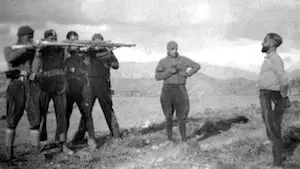Infiltrators or collaborators with the enemy.
Fifth column
What's the meaning of the phrase 'Fifth column'?
What's the origin of the phrase 'Fifth column'?
In October 1936, in the hostilities of the Spanish Civil War, the nationalist General Emilio Mola and his supporters besieged Madrid with four columns of troops.
Mola claimed he had additional troops within the city. The claim was reported in the New York Times like this:
Police last night began a house-to-house search for Rebels in Madrid… Orders for these raids … apparently were instigated by a recent broadcast over the Rebel radio station by General Emilio Mola. He stated he was counting on four columns of troops outside Madrid and another column of persons hiding within the city who would join the invaders as soon as they entered the capital.”
Explicit mention of the hidden troops as the ‘fifth column’ was reported in the US newspaper the Fitchburg Sentinel newspaper, on 14th October 1936:
“Out of hiding came a few of the phantom ‘fifth column’ – the fascist auxiliary force dreaded by the loyalists.”
The term has migrated in use over time and is now sometimes used more generally, to mean traitor or spy.
Ernest Hemingway wrote a play called ‘The Fifth Column‘ in 1937, in which he expressed his opposition to the Spanish fascist regime.
The history of “Fifth column” in printed materials
Trend of fifth column in printed material over time
Related phrases and meanings
Browse more Phrases
About the Author

Phrases & Meanings
A-Z
A B C D E F G H I J K L M N O P Q R S T UV W XYZ
Categories
American Animals Australian Bible Body Colour Conflict Death Devil Dogs Emotions Euphemism Family Fashion Food French Horses ‘Jack’ Luck Money Military Music Names Nature Nautical Numbers Politics Religion Shakespeare Stupidity Entertainment Weather Women Work
How did we do?
Have you spotted something that needs updated on this page? We review all feedback we receive to ensure that we provide the most accurate and up to date information on phrases.
